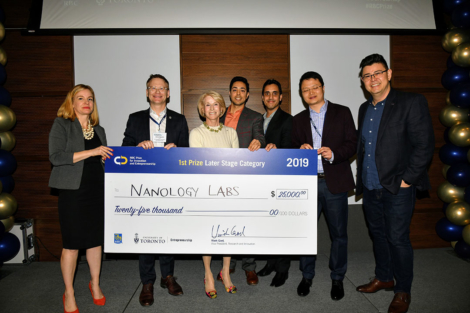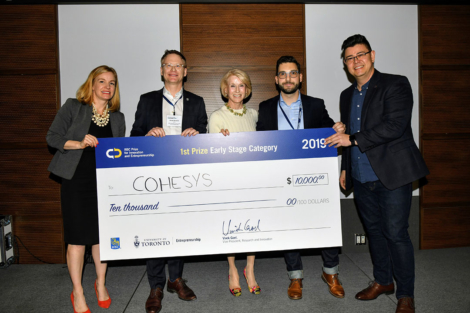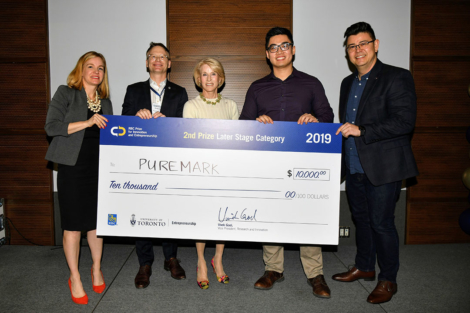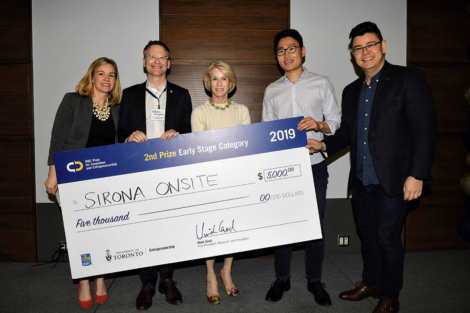The silence that hung over the MaRS Auditorium after Mohammad Ali Amini had finished his five-minute Nanology Labs pitch spoke volumes. It was not, by any means, an apprehensive or awkward silence — instead it was one of appreciation for his startup’s ambitions that demarcated his pitch from the rest. This time, the seven-minute Q&A period dedicated for the panel of six expert judges to scrutinize market feasibility spawned a solitary question and lasted for just 26 seconds.
Amini had presented his cancer-treating nanotechnology startup with an air of confidence and insightful clarity that made Nanology Labs’ eventual $25,000 Later Stage first prize victory no surprise.
The RBC Prize for Innovation & Entrepreneurship is an annual pitch competition during which 10 U of T startups compete for a total of $50,000 in prize funding. The competition is the finale of the True Blue Expo, the capstone event of U of T Entrepreneurship Week.
Five finalists competed in the Early Stage competition, designed for startups with less than $20,000 in cumulative funding and cumulative revenue; the other five competed in the Later Stage competition, for startups that have had between $20,000 and $100,000 in cumulative funding and less than $100,000 in cumulative revenue.
Michael Floros’ Cohesys and Alan Li’s Sirona Onsite claimed the $10,000 and $5,000 first and second prize victories in the Early Stage competition respectively, while Noah Yang’s PureMark won the $10,000 Later Stage second prize.
Nanology Labs
Amini’s startup produces a “non-toxic MRI contrast agent” called Manganescane that is more effective in detecting early-stage brain tumours. According to Amini, 65 per cent of brain cancer patients are diagnosed when they are already in the advanced stage. Nanology has developed a prototype of the solution that has been pre-clinically validated. This year, it will scale up production and begin to have its safety validated in dogs. By 2021, it hopes to have the formula manufactured and used in clinical trials before a product launch by 2024. Amini provided a “conservative” estimate that Nanology Labs will make between $120 million and $150 million annually by 2029. The $25,000 prize will be used in part to support the salary for a PhD candidate whom they will hire.
Nanology Labs has relied on support from a number of U of T incubators, including UTEST, the Health Innovation Hub, the Creative Destruction Lab, and the Impact Centre. “[These have helped] us very much to tune the our business strategy and and forecast the financial plan and revenue,” Amini told The Varsity.
Cohesys
Cohesys founder Floros presented the first pitch of the event. Cohesys oversees the production of BoneTape, a flexible bone stabilization device that improves current treatment of craniomaxillofacial fractures, which are fractures in the head and face area. Floros noted that currently, hospitals use titanium plates to treat these fractures, which stay in a patient’s face for their entire life, leading to the potential complications. By contrast, BoneTape dissolves in about 18 months. Floros said BoneTape has “a lot of advantages over the competition [because] it takes less time and it will likely have less complications.” As for the revenue potential of the market Cohesys hopes to break into, Floros observed that $2 billion USD of devices such as plates and screws are sold per year in five European countries and the United States. Eventually, the startup hopes to partner with distributors and medical schools.
It will use parts of the $10,000 prize to file a patent on Cohesys’ production methods in April. In the long-term, Cohesys hopes to break ground into the sternal closure area, as chest-bone breakages currently also rely on plates and screws to mend.
PureMark
PureMark protects products from being counterfeited using “secure authentication technology with social media integration.” PureMark works with manufacturers to embed a secure cryptographed near-field communication chip in their products. Users will need to download the PureMark app, which will allow them to scan PureMark chips to verify the authenticity of their products. Currently, PureMark is focused on preventing Western goods from being counterfeited in China. “I can personally attest to the growing popularity of Canadian brands in China and we want to help Canadian companies maximize this opportunity without being targeted,” Yang said. PureMark is finalizing the hardware and software for pilots with two Canadian wine companies and is also in discussion with clothing companies Arc’teryx and Moose Knuckle, as well as the Canadian Honey Council. Software lead William Kwan added that brand-specific protection makes it “very hard to educate the customer” due to various different regulations. “Our idea is that all these Chinese consumers [can] go to PureMark.”
Sirona Onsite
Li’s startup Sirona Onsite brings eye examinations to the convenience economy. “Everything from transportation to groceries is delivered to our doorstep on the click of a button. I think health care is the natural next step,” he said. Sirona Onsite will give users easy and convenient access to onsite health exams so that they do not have to visit physical stores. Additionally, while some eye centres provide onsite examinations, Li wants to build a platform to “democratize mobile optometry and improve patient care using data and machine learning.”






